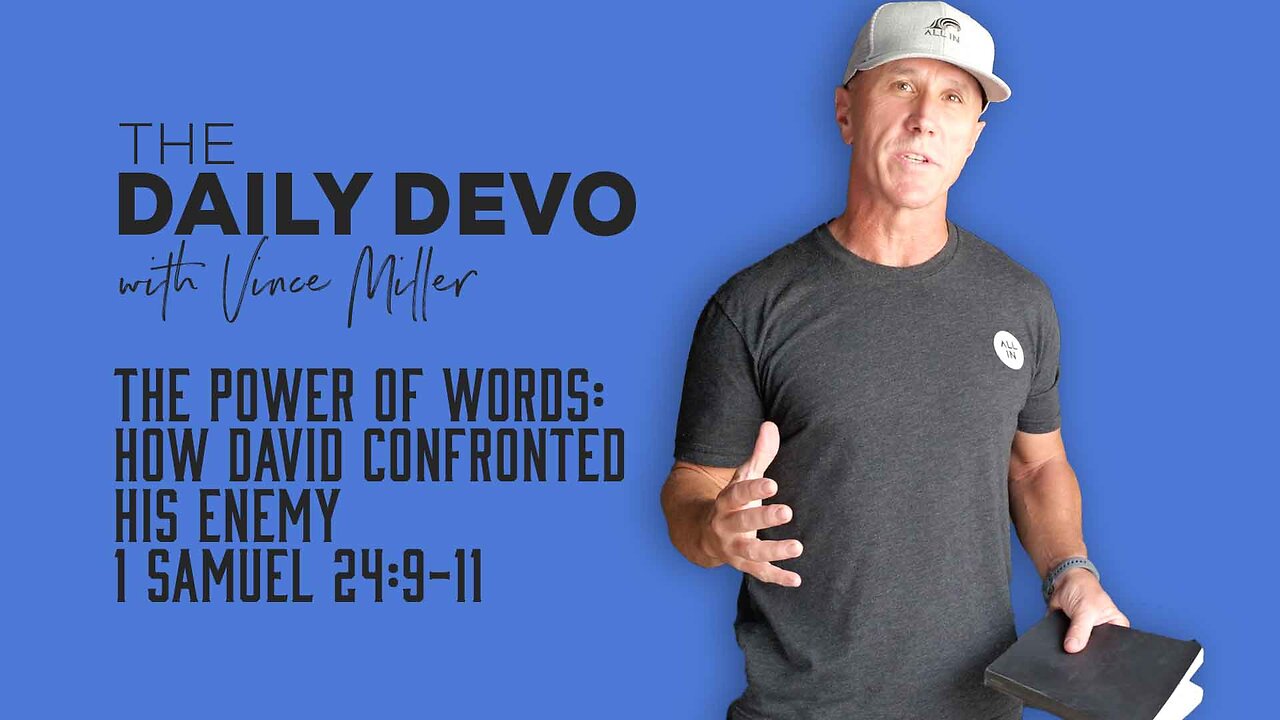Premium Only Content

The Power of Words: How David Confronted His Enemy | 1 Samuel 24:9-11
Sometimes, battles are fought with words and not swords.
Welcome to the Daily Devo. I am Vince Miller.
In our story, David puts his men in a risky situation by not cutting down Saul in the cave while he has the chance. But he is left to deal with Saul, so he walks out of the cave to confront the situation and deal with Saul and the consequences. What we listen to in our devotional for the next two days is one of the great speeches of David's life. Let's see what he says in 1 Samuel 24:9-11.
And David said to Saul, "Why do you listen to the words of men who say, 'Behold, David seeks your harm'? Behold, this day your eyes have seen how the Lord gave you today into my hand in the cave. And some told me to kill you, but I spared you. I said, 'I will not put out my hand against my lord, for he is the Lord's anointed.' See, my father, see the corner of your robe in my hand. For by the fact that I cut off the corner of your robe and did not kill you, you may know and see that there is no wrong or treason in my hands. I have not sinned against you, though you hunt my life to take it. — 1 Samuel 24:9-11
This moment marks a pivotal point in David's life, where battles are not won with swords but with words. David stands before Saul, a man who has relentlessly pursued him, and instead of striking him down, he seeks to convince Saul that he is not his enemy but, in fact, an ally. This act of bravery unfolds in front of his 600 men and the 3,000 soldiers standing ready to capture him.
Consider the risk involved! David steps into the open, armed with nothing but his words and the truth about his actions.
David's response teaches us that sometimes, our battles are fought with words rather than weapons. How you confront difficult situations can determine the outcome. David skillfully wielded his words. You, too, must also learn to fight this way in your life. Here are a few practices David deployed that you can use as well:
Proclaim the Truth: David didn't trust in his feelings or the misguided counsel of his allies. He took a hard stand and proclaimed the truth about his situation. You should express your truth honestly, rooted in the right tone in your conflicts.
Pursue Mercy: David had reason to retaliate but not the right to retaliate, so he pursued mercy instead. In your confrontations, you can opt for reconciliation rather than revenge. Remember, mercy can be a powerful tool for peace.
Prioritize Relationships: David called Saul "my father," reminding Saul of their connection. In your conflicts, you can prioritize the people and positions involved, helping soften hearts and opening doors for resolution.
Practice Integrity: David emphasized that he was not the treasonous man Saul believed him to be. In your battles, maintain integrity in your words and actions. Let your character shine through, serving as a witness to the truth.
As you go about your day, remember that you may encounter battles where words hold more power than weapons. Like David, may you confront your challenges with truth, mercy, and a commitment to integrity.
Fight well, knowing your words can be mightier than the sword.
#DavidAndSaul, #PowerOfWords, #FaithInConflict.
Ask This:
In what challenging situation have you found it difficult to choose words over actions, and how can David's example inspire you to respond differently?
How can you actively prioritize relationships and practice mercy daily, especially when facing conflict?
Do This:
Fight with words, not swords.
Pray This:
Lord, help me to embrace the power of my words in times of conflict, just as David did, and grant me the wisdom to choose truth and mercy over retaliation. May I prioritize relationships and maintain integrity in all my interactions, reflecting Your love and grace. Amen.
Play This:
Words.
-
 4:27
4:27
Through the Bible with Vince Miller
1 day agoCalling Back the Wanderer: Our Mission | James 5:19-20
161 -
 LIVE
LIVE
ttvglamourx
2 hours ago $0.38 earnedEGIRL VS TOXIC COD LOBBIES !DISCORD
168 watching -
 3:19:17
3:19:17
LumpyPotatoX2
4 hours agoSCUM: Lumpy Land RP Server - Day #1 - #RumbleGaming
6.99K2 -
 1:42:59
1:42:59
Game On!
17 hours ago $6.05 earnedTop 10 Super Bowl Bets You Can't Afford To Miss!
37.3K5 -
 2:17:02
2:17:02
Tundra Tactical
21 hours ago $21.10 earnedTundra Nation Live : Shawn Of S2 Armament Joins The Boys
137K26 -
 11:00:11
11:00:11
tacetmort3m
1 day ago🔴 LIVE - SOLO RANK GRINDING CONTINUES - MARVEL RIVALS
191K3 -
![Shadows Of Chroma Tower, Alpha Playtest [Part 1]](https://1a-1791.com/video/fwe2/1d/s8/1/5/Q/U/n/5QUnx.0kob-small-Shadows-Of-Chroma-Tower-Alp.jpg) 13:29:21
13:29:21
iViperKing
1 day agoShadows Of Chroma Tower, Alpha Playtest [Part 1]
158K8 -
 54:05
54:05
TheGetCanceledPodcast
21 hours ago $13.64 earnedThe GCP Ep.11 | Smack White Talks Smack DVD Vs WorldStar, Battle Rap, Universal Hood Pass & More...
140K34 -
 13:37
13:37
Exploring With Nug
1 day ago $9.64 earnedSUV Found Underwater Searching For Missing Man Jerry Wilkins!
99.9K4 -
 2:58:21
2:58:21
xBuRnTx
20 hours ago1st Warzone Stream Online
137K11